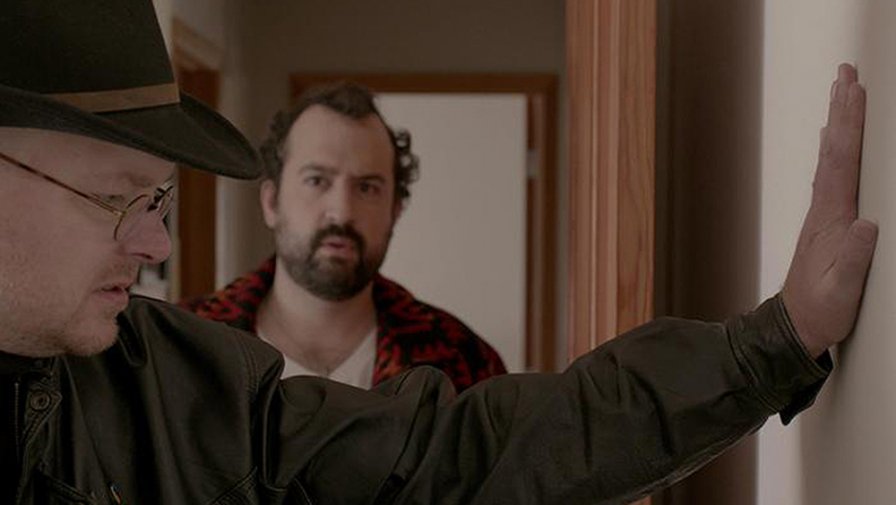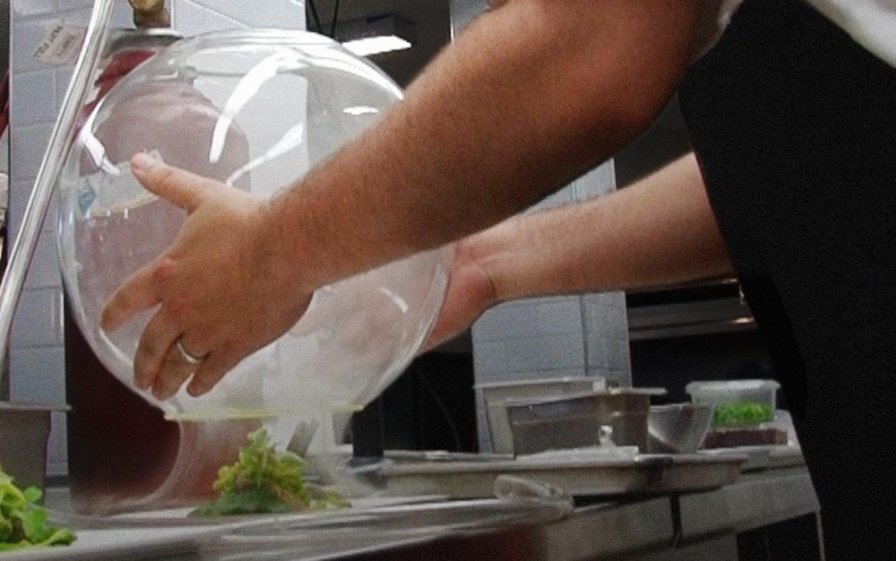My Blind Brother (dir. Sophie Goodhart)

Did you say a romantic comedy with Nick Kroll, Jenny Slate, and Adam Scott? Yes please! My Blind Brother has many trappings of a highly satisfying romcom — think Trainwreck — combined with the added slightly squirmy (and therefore appealing) edge of using blindness as a punchline, but for all the good feet the film puts forward, it makes no great strides. Jenny Slate and Nick Kroll play uninspired people with few compelling reasons to like (other than the fact that they are played by Jenny Slate and Nick Kroll) who fall in love, all the while with the blind brother of Kroll’s character, played by Scott, getting in the way. It’s an awkward take on mundane loser-love, with characters who try to do good but really, really just want to be watching TV. Anything, whatever’s on, it doesn’t have to be good.
Another Evil (dir. Carson D. Mell)

When there’s something strange in their mountain retreat, who are successful urban artists gonna call? In this case it’s a barely competent ghostbuster by the name of Os (Mark Proksch), who may or may not be up to the task of ridding the cabin of the spectral spirits. Mell’s film is often hilarious, basically a supernatural riff on Baghead with great dialogue between Proksch and lead Steve Zissis. Unfortunately, there’s a late tonal shift in the film that the movie doesn’t quite earn. However, for nine-tenths of the film it’s a very engaging, humorous character study of a man on the edge with peculiar ways about him that is expertly portrayed by Proksch.
The Trust (dir. Alex Brewer, Benjamin Brewer)

Out in the suburbs of Las Vegas, on a night like any other, two cops are breaking into a safe. What begins as a gleeful mismatched buddy-movie pastiche ends up as a cautionary tale of professional indifference, like if some twisted version of Adolf Eichmann’s banality of evil came to land at the DMV. Elijah Wood and Nicholas Cage are two Nevada cops who, seemingly with little else to do or want in the world, decide to initiate a massive heist involving German-engineered industrial drills and an apartment full of firearms. Things don’t go as planned. It’s a pretty silly movie, with some nice Coen-esque scored sequences and an enjoyably strange chemistry between the two leads, with hints at the imagined future of Cage’s baby-thievin’ character from Raising Arizona, while allowing Wood a solid space to act outside of Middle Earth. No masterpiece here, but a fun day in the desert.
Miss Sharon Jones! (dir. Barbara Kopple)

In a sense, this documentary was spoiled up and down for me. I knew it would be heartrending, inspirational and character-rich. When I got the news about Sharon Jones’ cancer I was wounded. When I saw her messages to fans I was reassured. And when I saw her holiday Tiny Desk Concert I was once again bowled over by her vibrant charm. I felt that same rollercoaster of emotion during this biopic, but with an added dose of reality. I wasn’t homesick, but I did feel a twinge at the ZACH Theatre when I saw that Jones had received her treatment in Albany, NY. We bracingly watch that magnetic je ne sais quoi fight through the cold indignities of chemotherapy and find ourselves practically holding our breath for her to make it through each hospital visit and back on stage where she belongs. Miss Jones/Kopple and co. also take us through her home town of Augusta (SC), where she shares childhood memories, fly fishes in a creek with a big cigar (apparently the two are essential components) and stops by a tiny local church to testify as only she can. Some might call that last bit grandstanding, but I challenge anyone to watch that scene and not see someone digging deep within themselves to be with their spiritual center at a time of intense need. Sharon Jones & The Dap Kings may not be making music that’s in fashion, but there is a grit and sincerity to their songs that easily drown out this notion. Whoever makes up their audience, they’re responding to a raw feeling and an impeccable presentation that redeems everything about vintage funk/soul that’s become shallow or merely fetishistic. That she loves Ellen so dearly (much joy is expressed at the opportunity to dance with her on her show) is only a reminder that she’s an entertainer of a certain age doing her thing in the world without (for better of worse) a nuclear family to look after. Cancer may have humbled her somewhat, but her light remains massive, ageless and heedless to obstacles large and small. That she is (literally) letting the world see her underbelly only makes her burn brighter. Kudos to Barbara Kopple for stepping up and delivering such a perfectly pitched, far-from-obligatory portrait.
In A Valley Of Violence (dir. Ti West)

While still bloody and full of splatter, In A Valley Of Violence marks a departure for writer/director Ti West from the horror genre to the revisionist Spaghetti Western territory. The film is surprisingly hilarious with lots of Western tropes shown to be ridiculous and many characters as shrill as possible. Ethan Hawke is perfect as the stoic Gary Cooper-type who only speaks in quotable tough-guy maxims while he squares off against a group of small-town lunatics, led by James Ransone as the would be tyrant and John Travolta in full ridiculousBroken Arrow/Face/Off villain mode. It’s an entertaining and surprising hit that also includes one of the cutest dogs on screen, with plenty of scenery for all of the actors to chew in their heightened performances.
Insatiable: The Homaro Cantu Story (dir. Brett A. Schwartz)

It’s highly unlikely that any significant portion of the audience for Insatiable will ever get to taste the food that comes out of Cantu’s restaurants in Chicago. The famed chef lauded for his Michelin-graded molecular gastronomy institution, Moto, was as well-known for his obsession with food innovation as he was for his rough early years, spent occasionally homeless and living with unofficial foster parents. As a documentary, the film does little to really vindicate Homaro’s impact on modern food, as we see little outside his realm of expertise and colleagues, but the focus remains on his vision and personality, and thankfully not insufferable montages of foamed and beaded foodstuffs being constructed on a plate (although there is definitely some of that). The concluding tragedy of the documentary comes with a somewhat deaf tone, leaving a bad taste in the mouth at the end, but the rest piles on enough of its subject’s charisma and clout to at least make you root for him.
Under The Shadow (dir. Babak Anvari)

Described by many as the Iranian Babadook, that shorthand tease does Anvari’s film a disservice as there’s a lot more going on here than a simple ghost story with a child involved. Anvari sets the film in 1989 at the very end of the Iran/Iraq war, and for much of it, the tension is derived not from the supernatural elements but from the chaotic changes a country is undergoing. Once the film begins to swerve into the horror elements, though, it delivers possibly one of the best jump scares ever and also an excellent metaphor for the creeping dread the protagonist feels about her changing country. A dynamic film with excellent performances that brings in viewers only to terrify them, Under The Shadow should not be missed for those seeking intelligent horror films that will still give them the heebie jeebies.
More about: SXSW
